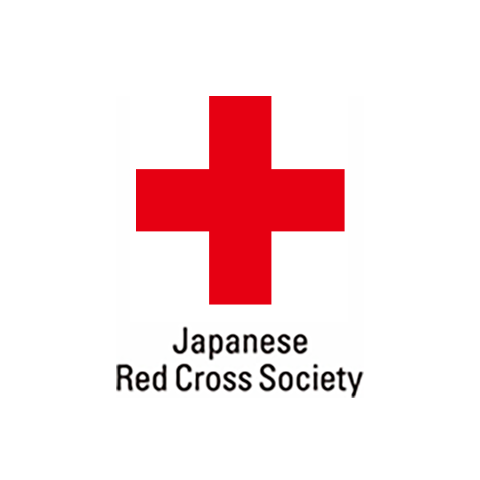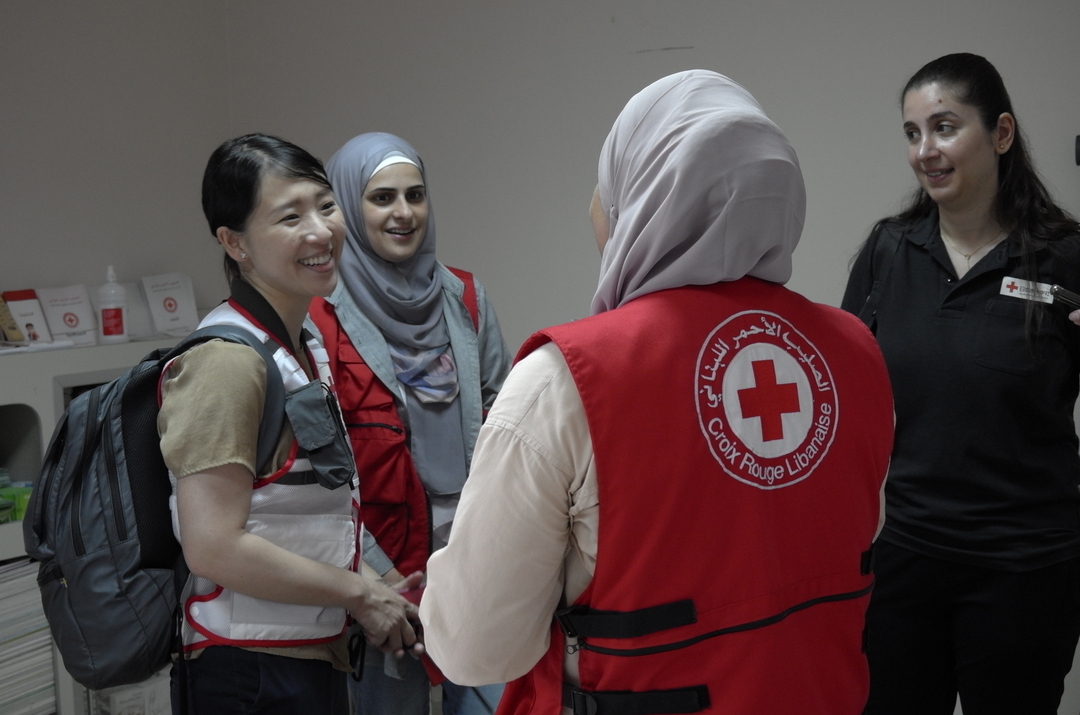Review of International Activities in FY 2023 - No.3 -
No.3: International Relief
Humanitarian crises due to natural disasters and armed conflicts are constantly occurring around the world, threatening people’s lives, health and dignity every day. Looking back on fiscal 2023, in addition to the heart-wrenching hostilities such as the seemingly never-ending Russia-Ukraine international armed conflict and the escalation of the conflict in Israel and the occupied territories, it was also a year full of large-scale fires, floods and earthquakes that seriously impacted people's lives.
The international relief efforts of the Japanese Red Cross Society (JRCS) range from emergency response that immediately provides medical care, food, clothing, and shelter with the International Red Cross and Red Crescent Movement to supporting Red Cross and Red Crescent National Societies in the countries affected by disaster, conflict or other crisis in their relief and recovery through the overseas relief funds. The Movement is a global humanitarian network, which consists of the International Committee of the Red Cross (ICRC), the International Federation of Red Cross and Red Crescent Societies (IFRC) and the 191 National Red Cross and Red Crescent Societies. The JRCS focuses on the fields of health and medical care, which is the strength of our Society, and provides assistance based on local needs.
Responses to Refugees and Displaced People Caused by Armed Conflict
Ukraine Humanitarian Crisis Relief Programme
The Russia-Ukraine international armed conflict, which began in February 2022, continues to this day, and the situation remains severe.
The damage to civilians has also been extensive, with approximately 30,000 civilians reported to have been killed or injured (UNOHCHR). Even now, attacks are taking place in the conflict areas, with hundreds of casualties reported each month, and people have spent the last 2 years in fear of attacks.
Some 10 million people, or 25% of Ukraine’s population, have been forced to flee their homes due to the armed conflict and have been evacuated both within and outside of the country. In addition to those who have fled, there are many others in difficult situations, with around 14.6 million people still in need of humanitarian assistance (UNOCHA). A Red Cross survey found that 49% of those who have returned to Ukraine and 55% of those who have fled to countries around Ukraine still need urgent assistance. Since the beginning of this armed conflict, the Ukrainian Red Cross Society (URCS) has continued to provide a wide range of support to those in difficult situations together with the Red Cross and Red Crescent Movement partners, including the ICRC, the IFRC and the Japanese Red Cross Society (JRCS).
| Type of support | Number of people supported |
| Shelter | 2.22 million people |
|
Relief (Providing basic assistance) |
17.91 million people |
| Cash | 1.9 million people |
| Protection | 343,000 people |
| Health |
1.28 million people |
| Migration |
1.78 million people |
| WASH (Water, Sanitation and Hygiene) |
15.26 million people |
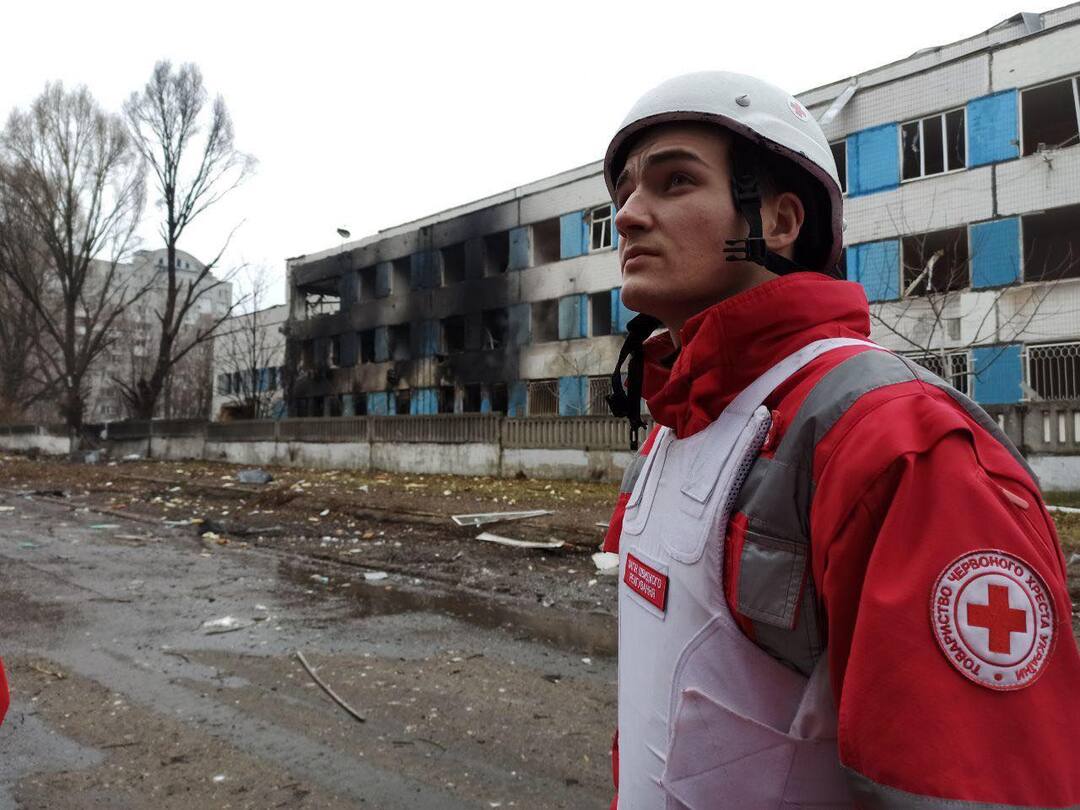
Rescue activity by the URCS Emergency Response Team ©IFRC
The JRCS’s current focus of support is bilateral projects in collaboration with the URCS. In accordance with the "One Plan 2023 -2025," a 3-year plan developed by the URCS, the JRCS has been carrying out nine projects, focusing on the fields of health and medical care, social welfare, and emergency relief support. With no end in sight to the armed conflict, emergency support is still essential. Additionally, the needs for health and medical care and social welfare have been becoming bigger when looking ahead to the reconstruction support. Currently, about 7.8 million people are in need of health support, which is the second largest need after protection and WASH (safe water, sanitation and hygiene) (UNOCHA). The armed conflict also makes the lives of the elderly and people with disabilities difficult. The JRCS supports health care and social welfare services mainly in the Western Region of Ukraine (Lviv, Ivano-Frankivsk, Zhtomyr, and Vinnytsa), and actively provides technical support and project management through the deployment of its rehabilitation and medical experts (Reference: Activity Report Meetings /2 year mark Support Progress Videos). The Ukraine Humanitarian Crisis Relief Fund, which has been generously funded by donations from many people in Japan, has enabled the implementation of projects that have benefited many people in difficult circumstances.
|
Health and Medical Services |
|
Social welfare |
|
Emergency Relief Support |
List of JRCS/URCS bilateral projects (as of February 2024)
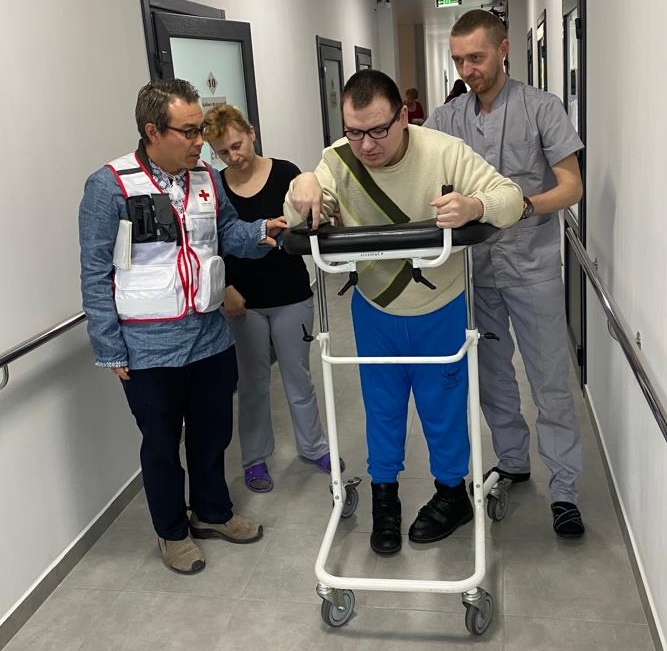
At a rehabilitation facility in Ivano-Frankivsk
Red Cross staff (physical therapists) conducting needs assessment
For more details, please visit the JRCS’s “Ukraine Humanitarian Crisis Relief Programme” page:
https://www.jrc.or.jp/international/results/ukraine_jrcs.html
Hostilities in Israel and the occupied territories
It has been more than six months since the escalation of hostilities between Israel and Gaza from October 7, 2023. The death toll on both sides has now exceeded 30,000. In Israel, over 130 families of hostages continue to endure anxiety and suffering. Meanwhile, in Gaza, there is a dire situation with a significant number of internally displaced people stranded in the southern part of Gaza due to a severe shortage of food, water, medicine and other basic necessities. The International Red Cross and Red Crescent Movement has been making urgent calls, which includes a cessation of hostilities, that will allow for meaningful assistance to reach people in need, then the Movement can significantly expand its assistance.
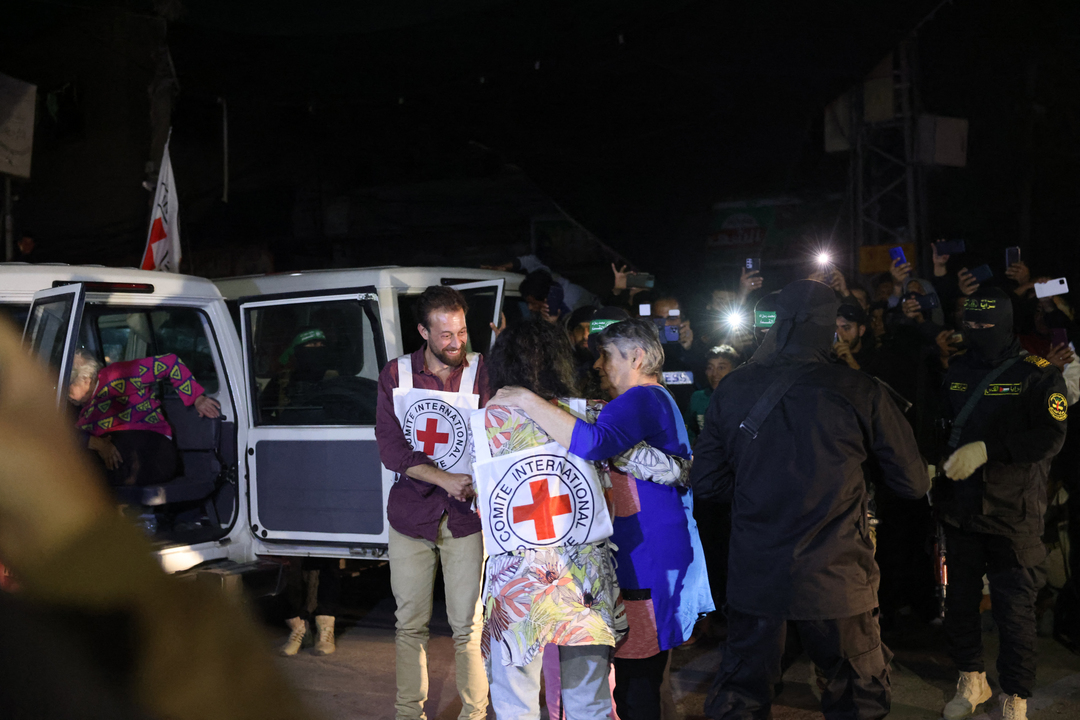
ICRC providing handover support during hostage release ©AFP
The Red Cross and Red Crescent Movement have been providing support for people in difficult situations since the beginning. The Palestinian Red Crescent Society (PRCS), headquartered in Ramallah, the West Bank, continues its operations to support local population including Palestinian refugees. It maintains branches in Gaza and surrounding countries where refugee camps are located. Their activities include transporting and treating the injured, receiving and distributing relief supplies from outside of the Gaza strip, and providing support in evacuation points. The International Committee of the Red Cross (ICRC) has been working to encourage parties to the conflict to remind them of their obligation under with the international humanitarian law, as the guardian of international humanitarian law(IHL), and has continued to play its role as a neutral intermediary to provide support in the release of hostages and the handover of detainees upon their release, as well as to provide emergency medical care.
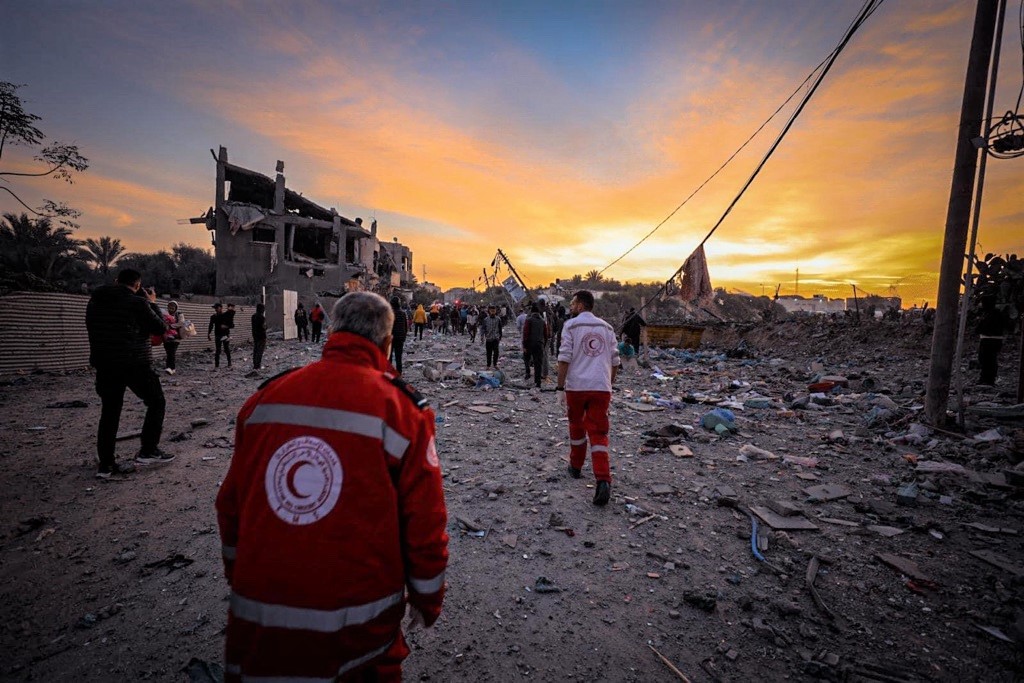
PRCS staff in route to the site ©PRCS
The Magen David Adom (MDA), which is a member of the International Red Cross and Red Crescent Movement in Israel, has been providing support for the transport of injured persons by ambulance, the provision of blood for transfusion, and the assistance for people displaced from border areas. In neighboring countries, the Red Cross and Red Crescent National Societies in Egypt, Lebanon, Syria, and Jordan are preparing for the assistance in case of the influx of refugees. In particular, the Egyptian Red Crescent is the only organization authorized by the Egyptian authorities to operate in the northern Sinai Peninsula bordering the Gaza Strip. It also works with the United Nations and other humanitarian organizations and plays a central role in the delivery of aid through the Rafah crossing. The IFRC supports the work of these Red Cross and Red Crescent National Societies.
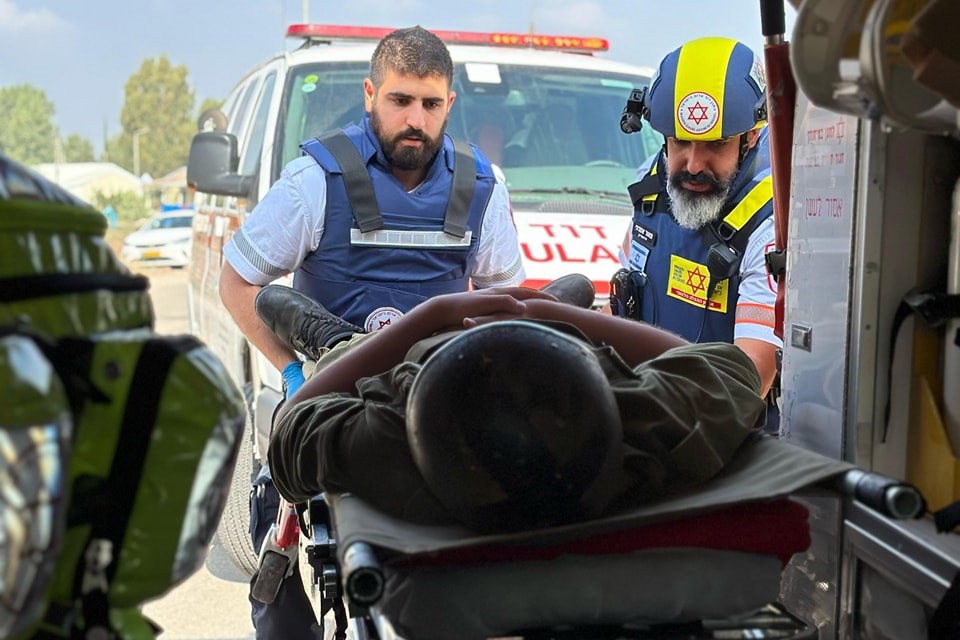
MDA staff transporting an injured person ©MDA
To support the activities on the ground, the JRCS started a fundraising campaign on October 17, 2023. As of January 31, 2024, the JRCS has received donations amounting to 477,255,711 yen. The JRCS continues to provide financial support to the MDA, the PRCS, the IFRC, and the ICRC. It has been discussing with the partners the most effective way to provide assistance under the severe circumstances. The JRCS also has published 20 news articles and held debrief sessions to foster increased understanding and support for the IHL and for principled humanitarian action with national and international stakeholders and actors of influence.
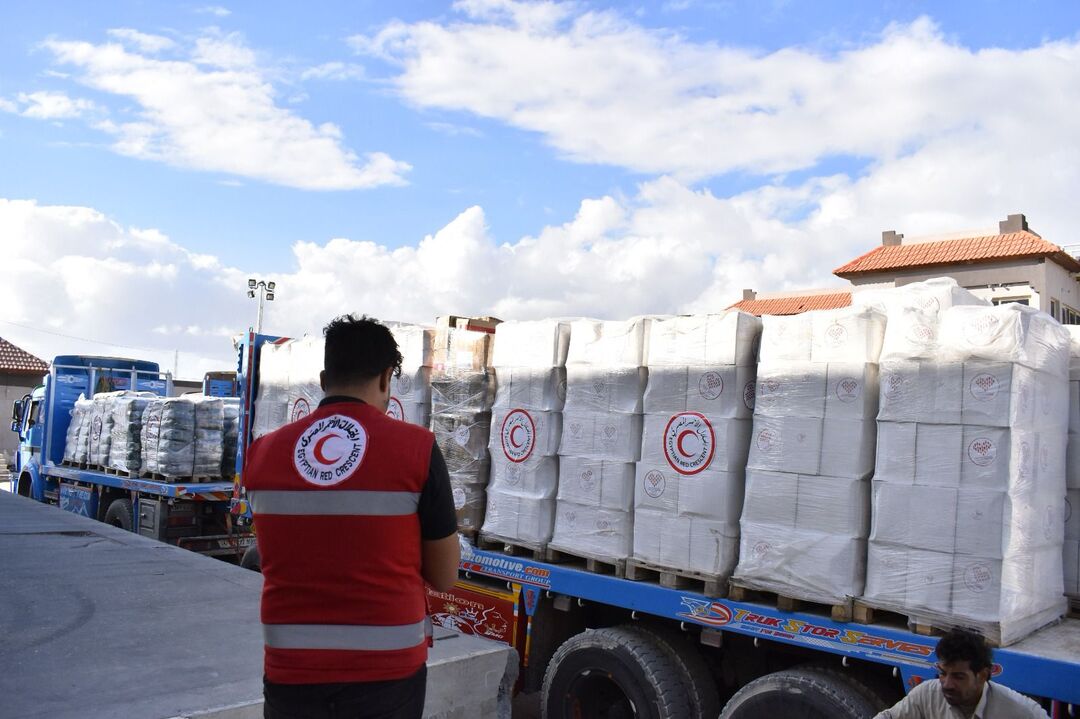
Egyptian Red Crescent staff transporting relief goods ©ERC
The JRCS and the other Red Cross and Red Crescent Movement partners will continue to provide assistance to people in distress and advocate for the need to comply with international humanitarian law.
For more details, please visit the JRCS’s “Israel/Gaza Humanitarian Relief Programme” page:
https://www.jrc.or.jp/international/results/Israel_Gaza.html
JRCS Humanitarian Relief Programme in the Middle Eastern Crises
Many people in the Middle East region have been affected by prolonged impact of conflicts and violence, such as the ongoing Palestinian-Israeli issue spanning over 70 years and sporadic clashes in the region since 2010. Particularly, refugees and displaced persons, who are forced to move from where they live, often face challenges in accessing necessities such as food, safe water, proper sanitation, basic medical services, and other essential infrastructure for living. In some countries, such as in Lebanon, the price of medicines has soared due to the recent economic crisis. In 2015, the JRCS established its Middle East Regional Office in Beirut, the capital of Lebanon, and has been working together with the Movement partners to provide long-term support. In 2023, as a bilateral project, the JRCS was engaged in a medical support project with the PRCS and a primary health care project with the Lebanese Red Cross (LRC). Through the IFRC and the ICRC, the JRCS has provided financial support for Red Cross and Red Crescent National Societies in the region in provision of food and safe water, improvement of sanitation, etc. The following is a detailed description of our bilateral projects.
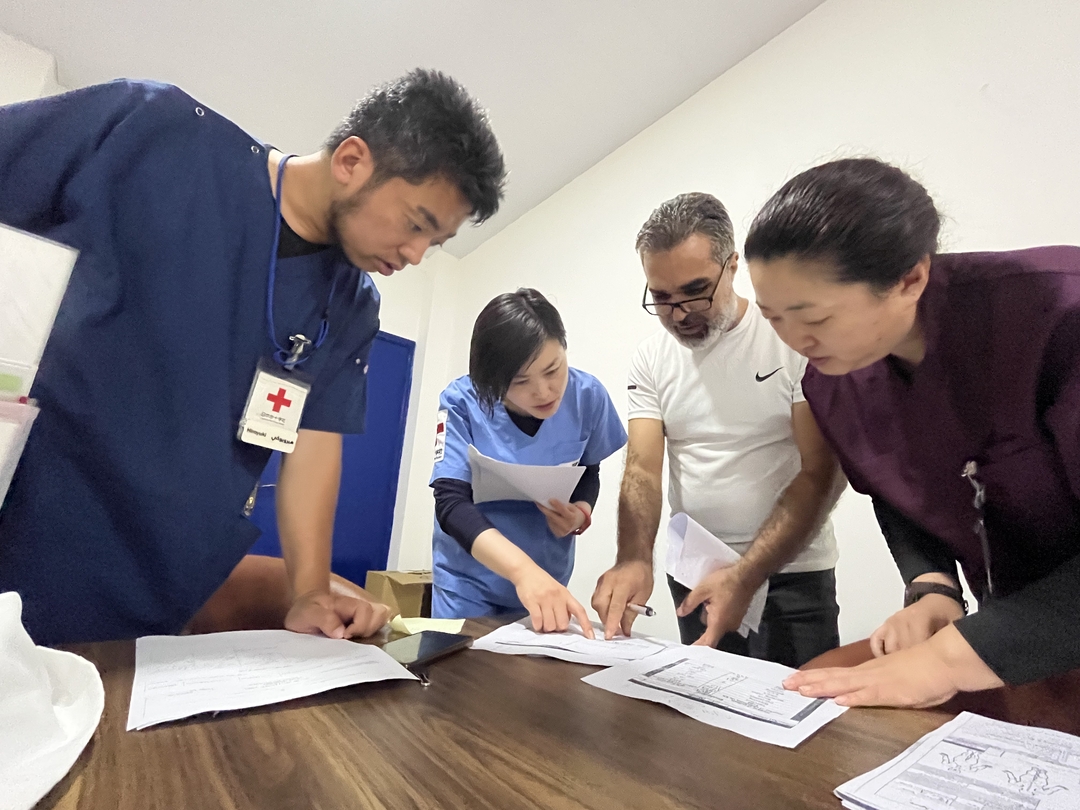
Medical Cooperation Project in Lebanon
The Medical Cooperation Projects with the PRCS aims to improve the quality of medical services at the hospitals operated by the PRCS in Lebanon and Gaza. Since health workers, who are themselves Palestinian refugees, have limited access to learn additional medical expertise, the JRCS dispatches Japanese doctors and nurses to share their skills. In 2023, the JRCS sent three doctors, five nurses, and three project officers and one regional representative to Lebanon, as well as, dispatched two doctors, one nurse, and one midwife to Gaza. In Lebanon, they worked with local doctors and nurses to take care of patients in emergency departments and hospital wards, to improve echo diagnostic capabilities, and to establish a system for accepting mass casualties. In Gaza, the JRCS provided online support during the COVID-19 pandemic and resumed deployment of JRCS staff to improve nursing practice and strengthen newborn care in July 2023. Unfortunately, these medical support projects have been temporarily suspended in both Lebanon and Gaza due to increased tensions in the region since October 2023.
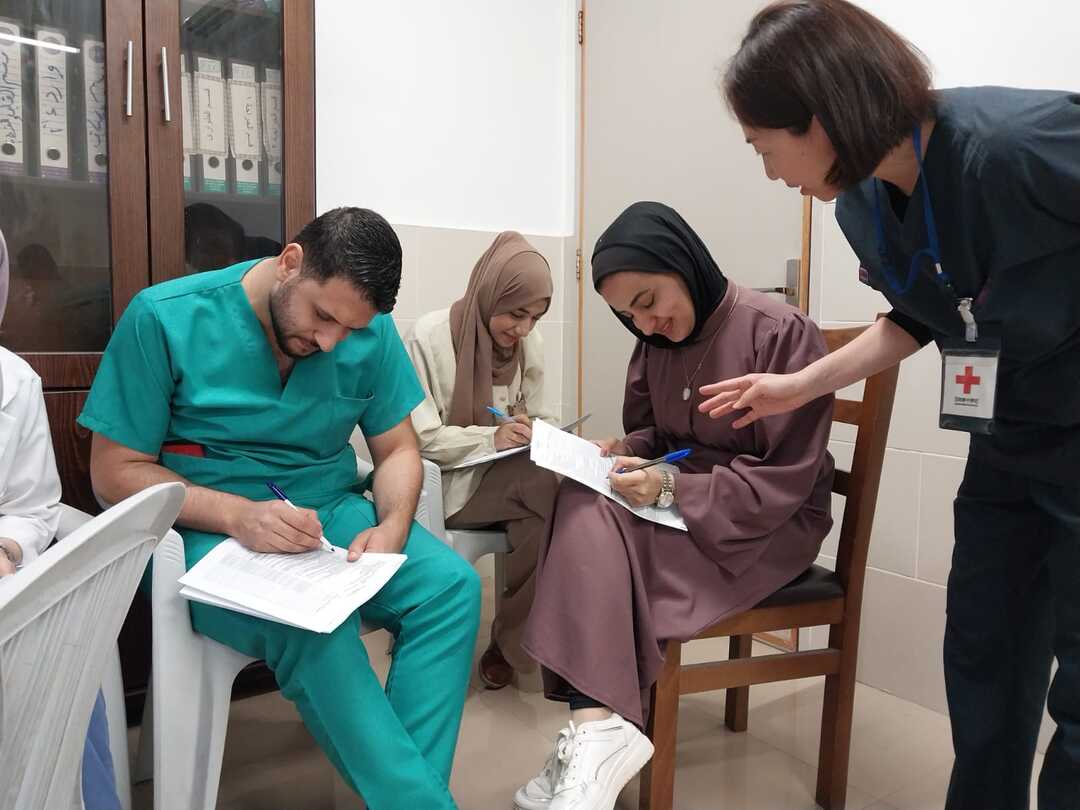
Medical Cooperation Project in Gaza
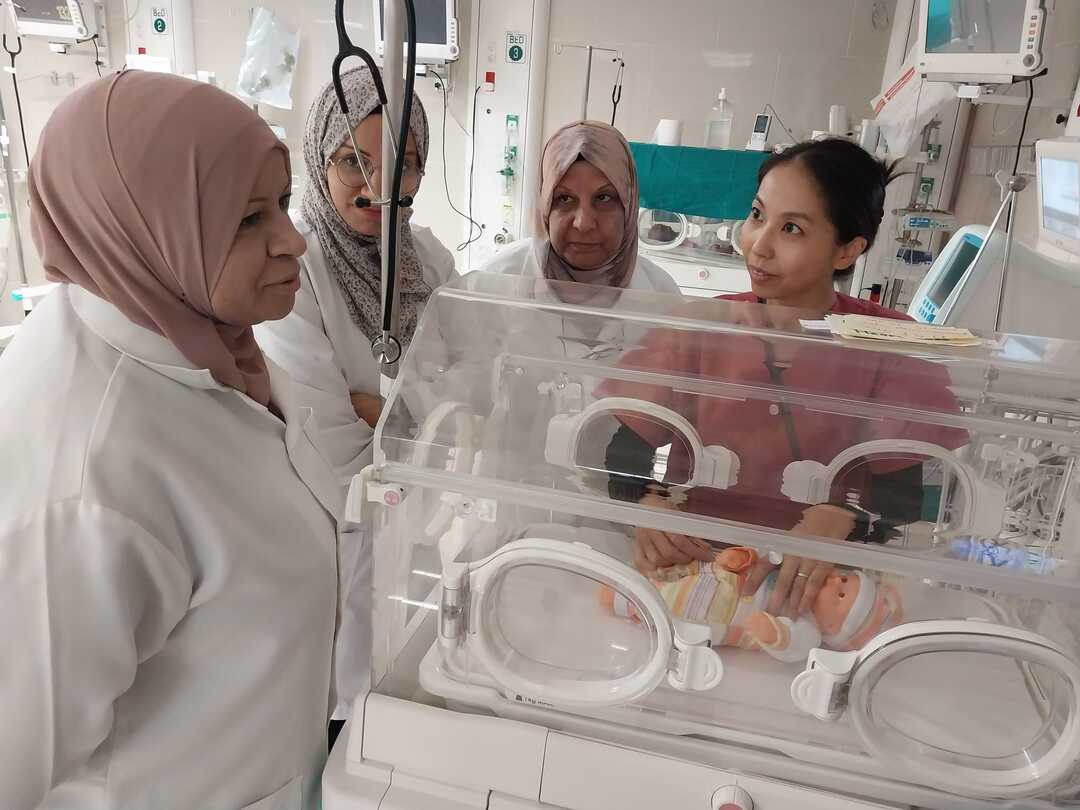
Medical Cooperation Project in Gaza
The Primary Health Care scale-up project with the LRC aims to contribute in reducing mortality and morbidity in Lebanon by improving access to preventive healthcare services for chronic and acute diseases. Specifically, the project supports the operation of primary healthcare centers owned by the LRC. We have been supporting three primary healthcare centers located in Tripoli, Batron, and Bouchale. For Lebanon’s vulnerable population and 1.5 million Syrian refugees in the country, community health centers are the last bastion of their health. According to the report, the number of center’s daily users have increased thanks to the improvements of the hygienic environment such as water tanks, drainage networks, drinking fountains, lavatories and other facilities.
PHC Scale-up Project with the LRC
The Middle East region is experiencing a growing array of humanitarian needs due to recurrent humanitarian crises. The JRCS will continue to provide support to the people in distress in this region, ensuring that we stand by their side.
For more details, please visit the “JRCS Humanitarian Relief Programme in the Middle Eastern Crises” page:
https://www.jrc.or.jp/international/results/middleeast_jrcs.html
Health Care Project in Cox’s Bazar, Bangladesh
It has been seven years since many people fled to neighboring southern Bangladesh in August 2017 to escape increased violence in Rakhine State, Myanmar. About one million people have been forced to live in camps for the displaced, facing severe economic and social constraints, as well as poor sanitation and harsh conditions that put them at risk in the case of natural disasters. While aid organizations and funding have been on the decline due to other disasters and conflicts around the world, people have been forced to rely on assistance for their daily lives, and the needs for support in the camps for the displaced remain high. Following emergency medical relief in September 2017, the JRCS launched a health and medical assistance programme in May 2018, with the Bangladesh Red Crescent Society as a main actor, focusing on providing health and medical care, responding to chronic diseases, improving maternal and child health, and disease prevention.
This project aims to provide more comprehensive support not to leave out people who need support by strengthening mutual cooperation among clinic activities, community health activities and psychosocial support (mental care activities). In fiscal 2023, the clinic received approximately 2,700 people (as of December 2023) every month, providing general medical care and maternal and child health services to a total of 24,000 people. The number of people visiting the clinic for chronic diseases such as diabetes and hypertension has been increasing, and along with medical examinations, the clinic has been implementing lifestyle changes and exercise guidance for patients with chronic diseases. Maternal and Child Health services have provided antenatal and postnatal health examinations, newborn health examinations, and family planning counseling in the camps for displaced persons, where there are many childbirths with a high neonatal mortality rate, to support the maintenance of maternal health and the healthy growth of children.
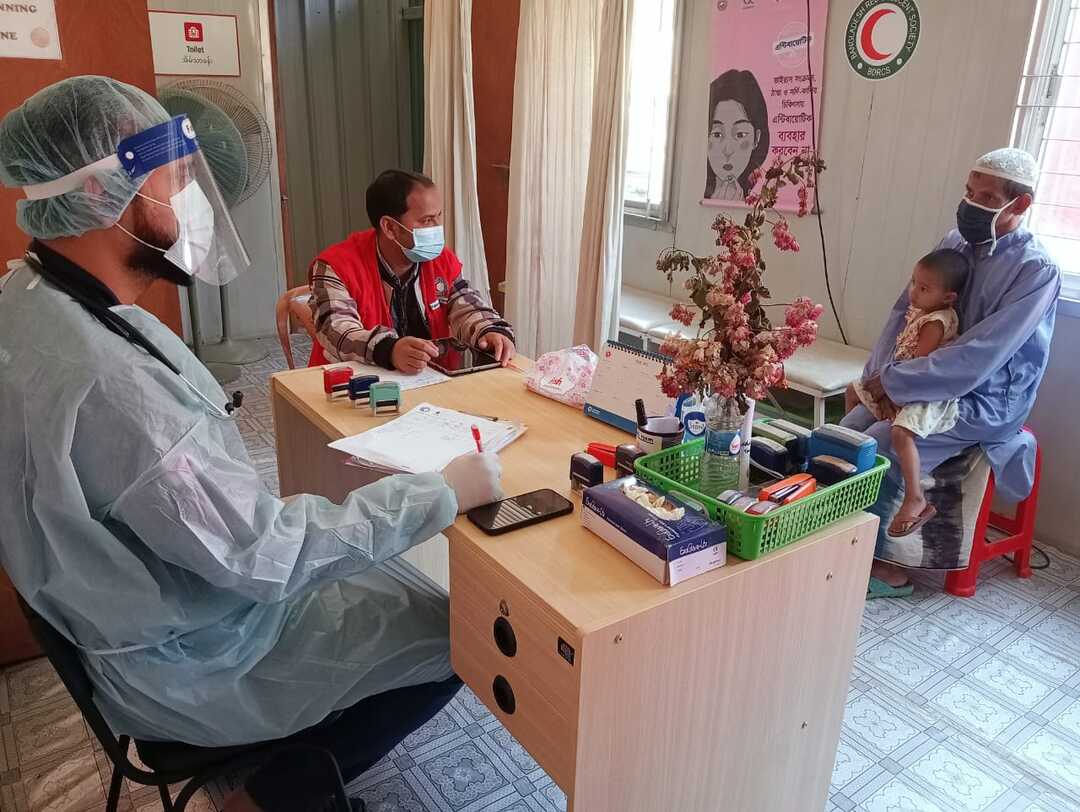
Examination at the clinic
In community health activities, the displaced people themselves volunteer to spread knowledge on infectious disease prevention, first aid, and nutrition through home visits in the community and group health awareness activities. The goal of home visits is for volunteers to visit the same family at least 2 times a month. In fiscal 2023 (as of December 2023), more than 34,000 home visits were conducted, and more than 3,900 group health awareness sessions were held. The trust relationship between volunteers and local residents is built through the continuous involvement of the volunteers in the local communities. In addition, volunteers and clinic staff have built a good mutual cooperation system by exchanging information on a regular basis. Based on this trust relationship and mutual cooperation, the volunteers make efforts to connect local residents with clinics, for example, by encouraging patients with chronic diseases to visit clinics regularly so that they can maintain a healthy lifestyle, and by checking the status of antenatal and postnatal checkups in the community. In an environment where medical resources are limited, health knowledge is critical for the people to prevent diseases and save lives by themselves. Therefore, community health activities to raise awareness of health issues at the grassroots level is meaningful. In addition, host communities in Bangladesh also experience a significant impact on their livelihoods because they received a number of displaced people. Therefore, this project has been expanded to the host community for health activities to provide services.
In terms of psychosocial support, more than 10,000 people received the care. Through activities tailored to the interests and lives of each generation, as well as individual psychological first aid for children and adults, the JRCS and the BDRCS continue to provide support for the people to reduce anxiety about the future, to have positive self-affirmation and a sense of connection with community connections, and to live with hope. At the clinics supported by the JRCS, they also provide psychological first aid to those who are referred by doctors and midwives, and have strengthened their system to listen to patients' problems and concerns and connect them to necessary support and services.
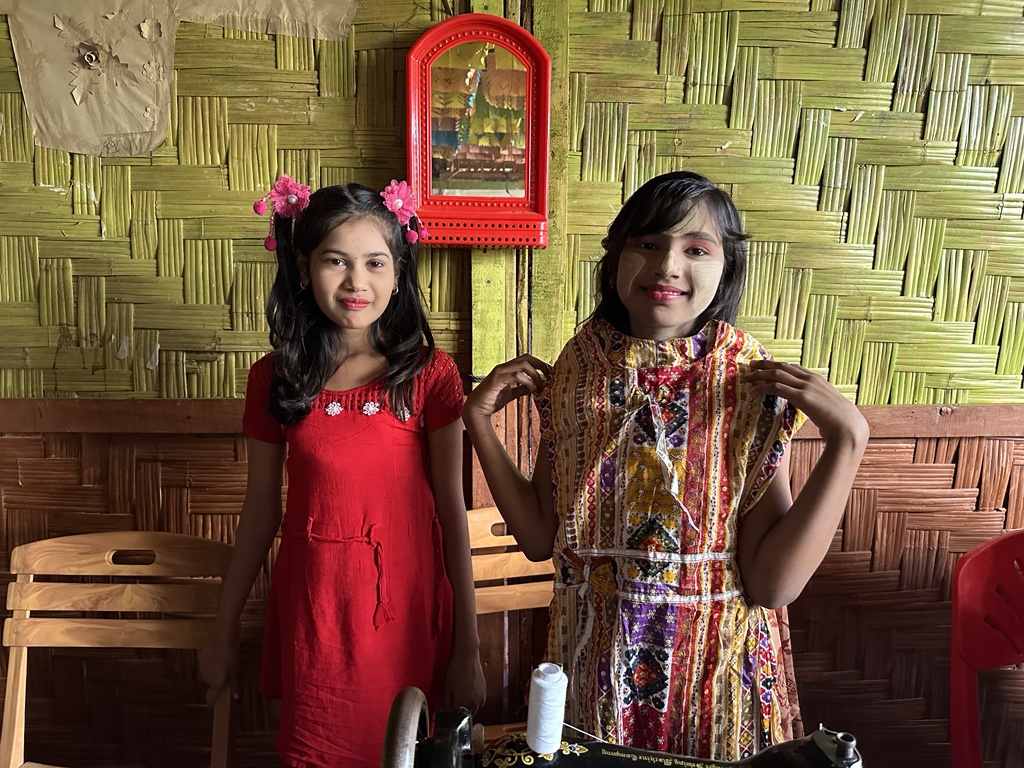
A girl in the camp showing the clothes she made in psychosocial support activities
The international community is in the process of reorganizing and streamlining projects to support the displaced population in southern Bangladesh in response to the decrease in aid organizations and funds, and the changes in needs due to the prolonged crisis. Amid the expected prolongation of the crisis, there is an urgent need to review assistance methods in order to effectively utilize limited funds and resources.
In the current prolonged situation, the local staff and the volunteers from the displaced population involved in the JRCS project have developed a sense of mission and confidence in their activities to contribute to the community through their continued engagement in the project. The JRCS will contribute to the promotion of the health of the displaced people and the local communities through health and medical assistance, and will support those involved in the project to develop the strength and capacity to face their own challenges.
(* The JRCS in accordance with the International Red Cross and Red Crescent Movement does not use the term “Rohingya” in consideration of the political and ethnic backgrounds and the diversity of people who have been displaced.)
For more details, please visit the JRCS’s “Health and medical support for displaced people in southern Bangladesh” page:
https://www.jrc.or.jp/international/results/bangladesh_jrcs.html
